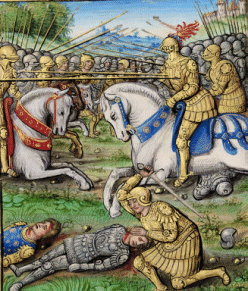
The Hundred Years War

J
oan of ArcAt the age of 13, Joan of Arc convinced Charles, the heir to the French throne, that God had sent her to save France during the Hundred Years’ War with England. She led the French to several military victories over the English in 1429. Joan of Arc was captured by the English and burned at the stake in 1431.
The Hundred Years' War was fought on French soil and marked the end of chivalry and knightly warfare. Many of the troops involved were mercenaries. When there was a lull in the fighting, they simply hired themselves out to nobles or looted the countryside on their own. Instead of armored knights, the most important troops were the English archers, whose arrows penetrated armor and reduced the effectiveness of knightly cavalry. By the end of the Hundred Years’ War, both armies were using guns and cannons. Honorable knightly combat and chivalry were of little importance to the outcome of this war.
 For
a long time it looked as though the English would win, but in the 1420s the tide
began to turn. Here and there French peasants banded together to fight the
English. In 1429 a peasant girl named Joan of Arc convinced Charles, the heir to
the French throne, that she had been sent by God to save France. Joan led the
French troops against the English and then escorted Charles to the city of Reims,
where he was crowned king as Charles VII. Although Joan was captured and put to
death by the English in 1431, her actions marked the turning point of the war.
It ended with England's defeat.
For
a long time it looked as though the English would win, but in the 1420s the tide
began to turn. Here and there French peasants banded together to fight the
English. In 1429 a peasant girl named Joan of Arc convinced Charles, the heir to
the French throne, that she had been sent by God to save France. Joan led the
French troops against the English and then escorted Charles to the city of Reims,
where he was crowned king as Charles VII. Although Joan was captured and put to
death by the English in 1431, her actions marked the turning point of the war.
It ended with England's defeat.
The war affected France in many ways. During the fighting the French countryside was burned and the cities were plundered. Both peasants and townspeople revolted in protest. In 1358 the peasants rose up against the nobles in a revolt known as the Jacquerie. They blamed the nobles for losing the war and offering them little protection. The peasants burned manor houses and killed noble families. Their revolt was put down with equal savagery.
 Another
effect of the war was that the idea of France as a nation was born. Joan of Arc
helped inspire this idea. She saw the English as invaders, and she called upon
the French king, as the symbol of all France, to oust them. Before the Hundred
Years’ War there had been very little national feeling. People identified with
their local regions or towns instead. The Hundred Years’ War helped change this
idea in France.
Another
effect of the war was that the idea of France as a nation was born. Joan of Arc
helped inspire this idea. She saw the English as invaders, and she called upon
the French king, as the symbol of all France, to oust them. Before the Hundred
Years’ War there had been very little national feeling. People identified with
their local regions or towns instead. The Hundred Years’ War helped change this
idea in France.
Because the war was fought on French soil, it had little effect on England. Much of it was financed by royal profits in the wool trade, and therefore it did not result in new taxes. Few English knights participated in the war, and when it was over, very little had changed for the average English person.